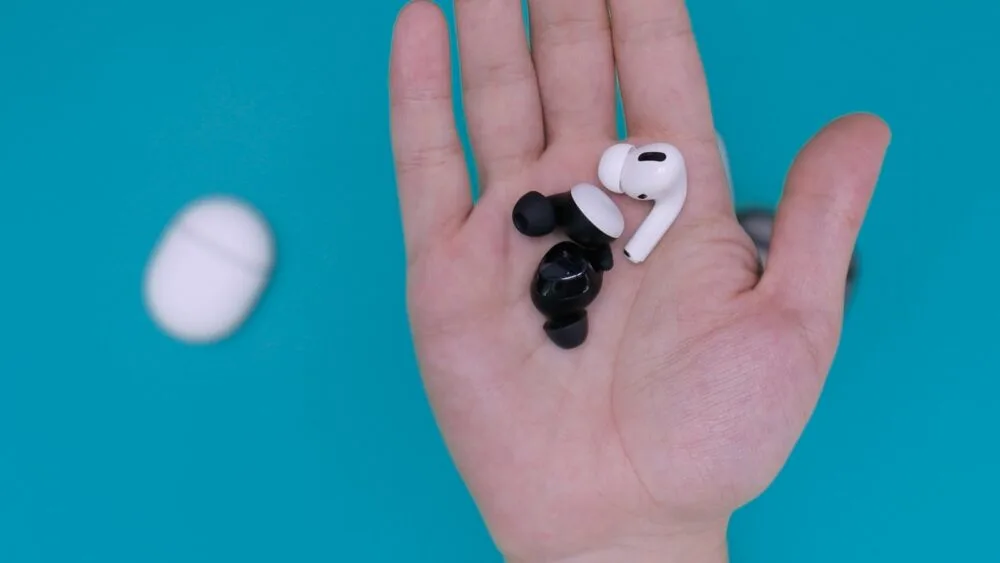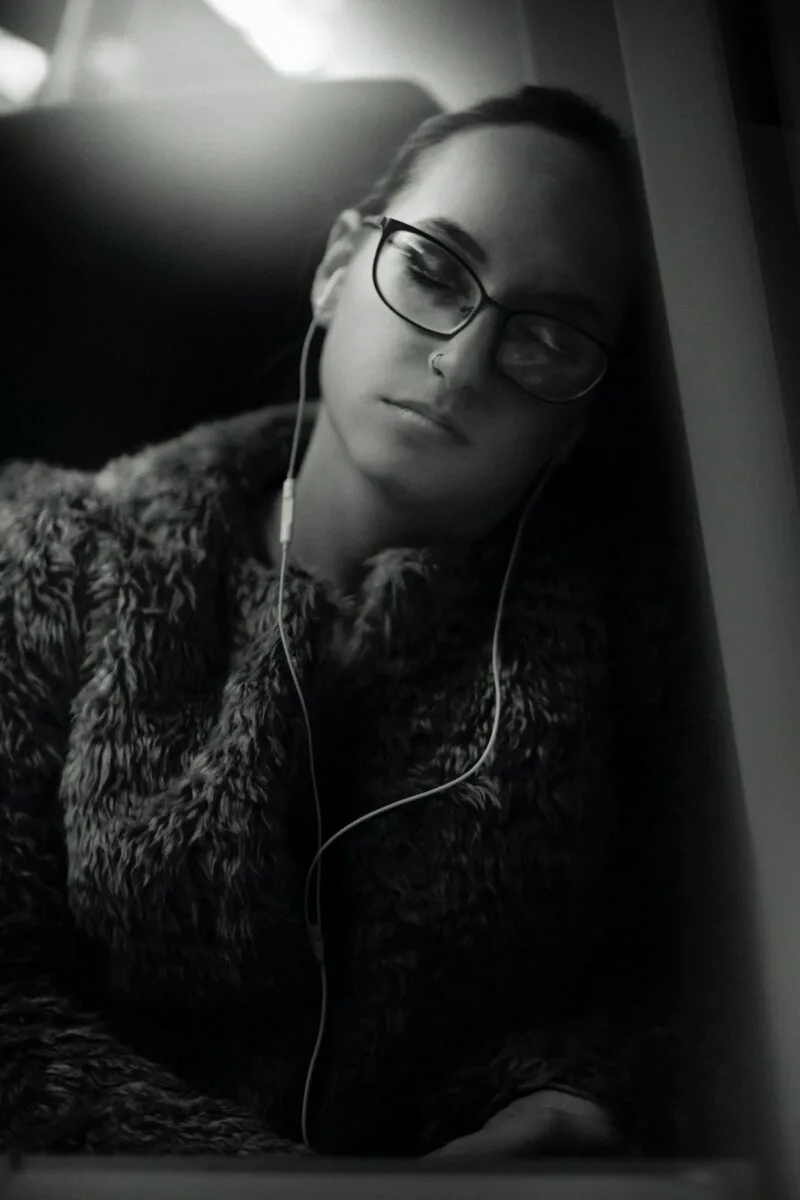Many enjoy falling asleep while listening to their favorite music, a podcast, or ASMR using headphones. It can be a way to relax, block out external noises, or enjoy entertainment before dozing off, especially if you are having trouble falling asleep. However, have you ever wondered, “Is it bad to sleep with headphones on?” This article will explore the potential dangers of sleeping with headphones on and discuss alternatives.
Dangers of sleeping with headphones on
While sleeping with headphones on may seem harmless, you should be aware of several risks associated with this habit.
Buildup of earwax
Wearing headphones for extended periods while sleeping can cause a buildup of earwax. This is because the headphones can prevent proper ventilation of the ear canal, leading to increased moisture and wax accumulation. Over time, this can result in discomfort, hearing impairment, and infection.

Strangulation
Another danger of sleeping with headphones on is the risk of strangulation. If the headphones have cords, they can become tangled around your neck while you toss and turn during sleep, posing a severe risk of strangulation or injury.
Swimmer’s ear
Sleeping with headphones on can also increase the risk of developing a swimmer’s ear, a condition characterized by inflammation and infection of the ear canal. This is because the headphones can trap moisture in the ear canal, creating a favorable environment for the growth of bacteria and fungi.
Necrosis
Prolonged pressure on the ears from sleeping with headphones on can also lead to necrosis, which is the death of cells and tissues due to restricted blood flow. This can result in pain, discomfort, and even permanent damage to the delicate structures of the ears.
Tinnitus
Wearing headphones while sleeping can also exacerbate or trigger tinnitus, a condition characterized by persistent ringing, buzzing, or other ear noises. The proximity of the headphones to the ears can increase the sound volume and potentially worsen tinnitus symptoms.
Otitis
Otitis, or inflammation of the ear, can also be a risk associated with sleeping with headphones on. The prolonged pressure on the ears can cause irritation and inflammation of the ear canal, leading to discomfort and potential infection.
Hearing loss
Perhaps the most concerning risk of sleeping with headphones on is the potential for hearing loss. Listening to music or other audio content at high volumes for extended periods can damage the delicate structures of the inner ear, leading to permanent hearing loss over time.
Alternatives to sleeping with Headphones
If you enjoy falling asleep with some form of audio stimulation but want to avoid the risks of sleeping with headphones on, there are alternative options.
Noise-canceling headphones
If you’re worried about external noises disturbing your sleep, you can consider using noise-canceling headphones. These headphones use technology to actively block out external sounds, allowing you to enjoy audio content without turning up the volume to dangerous levels. But they’re still headphones, so let’s look at other solutions.
White noise machine
A white noise machine is another alternative to consider. These devices produce a constant, soothing sound that can help drown out external noises and promote a calm sleeping environment.
Earplugs/earbuds
Simple foam or silicone earplugs can also effectively block out external noises without needing headphones. They are cheap, disposable, and do not pose the same risks as wearing headphones while sleeping. Some types of earplugs also come with active noise cancelation, however, some people don’t like them because they block everything and are uncomfortable. If you’re one of those, here are other alternatives to earplugs for sleeping.

Bluetooth speaker
If you prefer to have audio content playing while you sleep but do not want to wear headphones, consider using a Bluetooth speaker at a safe distance from your bed. This way, you can still enjoy audio content without the risks of wearing headphones.
Reasons why you cannot fall asleep easily
Apart from using headphones or other audio devices, there could be underlying reasons why you have trouble falling asleep. Identifying and addressing these factors can help you improve your sleep quality without relying on headphones.
- Stress: High-stress levels can disrupt your sleep patterns and make it difficult to fall asleep. Finding ways to manage stress, such as practicing relaxation techniques, exercising, or seeking support from a therapist, can help you sleep better.
- Poor sleep hygiene: Unhealthy sleep habits, such as irregular sleep schedules, excessive caffeine or alcohol intake, and engaging in stimulating activities before bedtime, can interfere with your ability to fall asleep quickly. Establishing a consistent and relaxing bedtime routine can improve sleep quality.
- Environmental factors: Noise, light, and temperature in your sleep environment can also affect your ability to fall asleep. Creating a sleep-friendly environment using blackout curtains and earplugs and adjusting the temperature can promote better sleep.
- Electronic devices: The blue light emitted by electronic devices, such as smartphones, tablets, and laptops, can interfere with your body’s production of melatonin, a hormone that regulates sleep. Avoiding electronic devices before bedtime or using blue light filters can help you sleep better.
Tips to help you sleep better within a week
If you’re struggling with sleep issues, here are some tips that you can implement to improve your sleep quality within a week:
- Establish a consistent sleep schedule: Try to go to bed and wake up at the same hours every day, even on weekends. This helps regulate your body’s internal clock and promotes better sleep quality.
- Create a relaxing bedtime routine: Develop a calming bedtime routine, such as reading a book, taking a warm bath, or practicing relaxation techniques, to signal your body that it’s time to wind down and prepare for sleep.
- Create a sleep-friendly environment: Make sure your sleep environment is conducive to sleep. Keep your bedroom dark, quiet, and at a comfortable temperature. Consider using blackout curtains, earplugs, or a white noise machine to block out external disturbances.
- Limit caffeine and alcohol intake: Avoid consuming caffeine and alcohol close to bedtime, as they can disrupt sleep patterns. Caffeine is a stimulant that can interfere with falling asleep, while alcohol can disrupt the quality of your sleep.
- Disconnect from electronic devices: Avoid using electronic devices, especially before bedtime, as the blue light emitted by screens can interfere with your body’s melatonin production. Create a technology-free zone in your bedroom to promote better sleep.
- Get regular exercise: Regular physical activity during the day can help you sleep better at night. Aim for at least 30 minutes of moderate exercise most days of the week, but avoid vigorous exercise close to bedtime as it can be stimulating.
- Manage stress: High levels of stress can disrupt your sleep. Practice stress-reducing techniques such as meditation, deep breathing, or yoga to help you relax and unwind before bedtime.

Is it bad to sleep with headphones on? Final Words
Sleeping with headphones on can harm your health, leading to risks such as earwax buildup, strangulation, swimmer’s ear, necrosis, tinnitus, otitis, and hearing loss. It’s important to be aware of these dangers and consider alternative options, such as noise-canceling headphones, white noise machines, earplugs, or Bluetooth speakers, to enjoy audio content while sleeping without risking your health.
Addressing underlying factors affecting your sleep quality, such as stress, poor sleep hygiene, and environmental factors, can also significantly contribute to better sleep. Prioritizing your ear health and overall well-being is crucial for a good night’s sleep. So, it’s best to avoid sleeping with headphones on and explore safer alternatives for a restful and healthy sleep experience. Or you can learn a few tricks on how to sleep with headphones comfortably without having most of the issues.